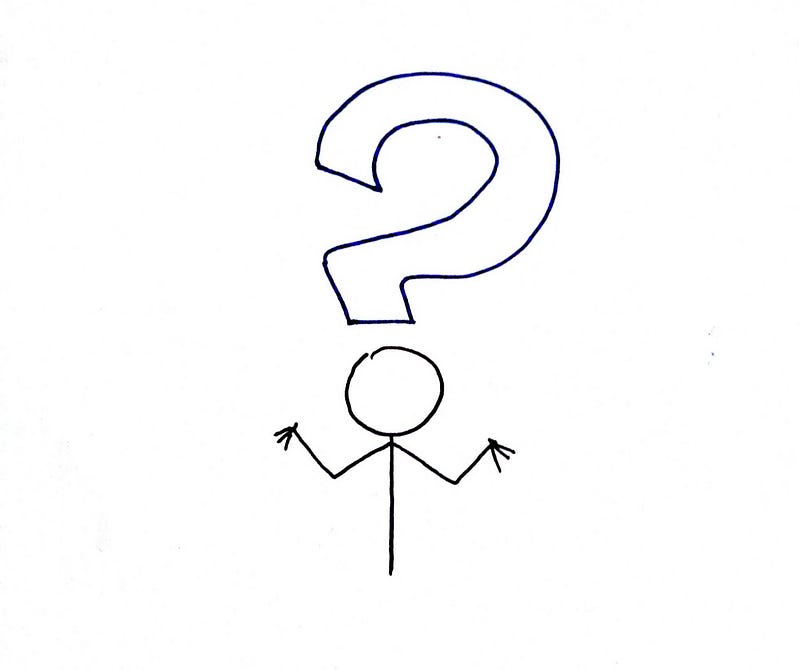A guide to Bitcoin
For the past few months I been interested in cryptocurrencies; primarily Bitcoin. I am so into it that I have gone ahead and started mining Bitcoins. And I hope by the end of this post; you too will be interested. 😊
Let’s start with a story; the story of Bitcoin. I have tried to keep this post as a non-technical one but there might be a few technical jargons; feel free to Google them and you should be able to find good answers. If you don’t; do tweet to me or post a comment and I will surely get to it. So here goes;
Why Bitcoin?
 Always… Start with Why!As Simon Sinek says; Start with why. Why gives you the backstory and that gives you context and context is everything! 🤪
Always… Start with Why!As Simon Sinek says; Start with why. Why gives you the backstory and that gives you context and context is everything! 🤪
While Bitcoin itself came into life in 2009 from a paper written by Satoshi Nakamoto, the journey started much earlier and I would argue that it was not the cyberpunks or the anarchists who made Bitcoin. But rather it was the people of technology and academics who had laid the ground work so Satoshi could build Bitcoin. The cyberpunk movement did play a part but it is nothing compared to the work done in the past 3–4 decades in the fields of cryptography and digital money.
In the world of computers; we have something call distributed computing. Which is a fancy way of saying dividing work among fellow computers on a network to get something done faster.
Remember those questions in Math class; If 1 man takes 7 days to build a wall how many days will 7 men take? This is an example of distributing labour.With distributed computing comes the challenge of distributed storage and retrieval. In most products/companies; the database is the single source of truth; meaning all the data is in one place. Wouldn’t it be nice if we could spread this data across different computers? Most database today allow this; it is called sharding.
Even after sharding; the data lives with just one organisation and one would have to pay for the service and also trust the person running the database to maintain the records accurately.
It would be nice; if we could maintain the database in different organisations/locations and everyone co-operated to keep the data accurate? All they have to do is trust each other.
 Bitcoin Baba after meeting Ethereum Guru
Bitcoin Baba after meeting Ethereum Guru
Unfortunately, the problem is; Trust doesn’t have a software version. There are no APIs of Trust in the virtual world. Bits don’t trust. So how does one incentivise these different independent parties to get along and maintain records genuinely?One way; humans have been able to get other humans to co-operate and be truthful is by giving them money. On the internet; there are no geographical boundaries and every country has their own currency paying all the people maintaining this distributed database is an accounting nightmare.
Enter Cryptos
What if for every transaction they all agree on; and add to the database; they get paid instantly by a token/currency which all of them can use. So, for any one of them to add an incorrect transaction; they will have to convince everyone on the network and that will become a very expensive exercise.
The crux over here is; cryptocurrencies are essential for rewarding members of a decentralised network to maintain the network and its database. Without cryptocurrencies; it is impossible to maintain a decentralized network. There was a need for cryptocurrencies to be invented in order to pay all these decentralised database service providers in the hyper connected network. It was not the other way around.
Governments run Banks. The US has the Federal Reserve and India has the RBI. They maintain the database of money. How much money is there and what should be its value (the second part is debatable) is something they control centrally. This has led to corruption as the banks have the incentive to act naughty and make money by screwing the public whose money they control.Banks run on this trust protocol. The only reason we believe a rupee is a rupee because someone (RBI Governor) promises to pay the bearer that value. But promises are meant to be broken 😝.
 Do Not TrustThere have been multiple attempts at making a currency independent of these central banks. Gold Bullion is one such example. In the digital world too; there have been multiple attempts. Bit Gold, DigiCash and HashCash are few of them. All of these attempts missed some part of the puzzle and couldn’t become a viable electronic digital currency. Satoshi (and Nakamoto consensus) changed that with the blockchain.
Do Not TrustThere have been multiple attempts at making a currency independent of these central banks. Gold Bullion is one such example. In the digital world too; there have been multiple attempts. Bit Gold, DigiCash and HashCash are few of them. All of these attempts missed some part of the puzzle and couldn’t become a viable electronic digital currency. Satoshi (and Nakamoto consensus) changed that with the blockchain.
The blockchain was the missing piece of the puzzle that has made digital currencies and decentralized software possible.Now that we have established that why Bitcoin was neccessary lets get into the details of how Bitcoin works.
How Bitcoin works.
Bitcoin is a software which can be run by anyone with a working internet connection. It was initially written by Satoshi Nakamoto but as of today is run by a team known as the Bitcoin Core developers.
Each of these machines running the bitcoin software is called a node. The software keeps giving out digital tokens (Money, Money, Money…) every 10 minutes. These software tokens are called bitcoins and is the currency of this network. Every miner has the equal probability of getting lucky and winning those bitcoins. The probablity is guaranteed via computer puzzles/cryptography.
Let’s dig into the details here;
Why every 10 minutes?
Trump endoses Bitcoin’s 10 minute windowThe Bitcoin blockchain is a glorified linked list. You might have read about linked lists in high-school/college computer science. A linked list is a list where one node has the address of the previous (or next).** In case of Bitcoin, every 10 minutes a node aka block is added to the network. Hence, the term blockchain.** Each of these blocks can contain upto 2000 transactions. Those transactions can contain any data but in case of Bitcoin it has transactions of the Bitcoins between different accounts(addresses). In some alternate blockchains, the transactions can contain some other info also like transfer of digital goods (music rights) from one person to the other.
How do transactions happen?
Proof of WorkTo make a transaction on the Bitcoin network, one has to convince one of the miners to add it to the block. And to make that happen, one has to pay a transaction charge. There is no fixed transaction charge and it is driven by Demand and Supply. The higher the transaction charge one pays the sooner it will be added to the block. However, its not instantaneous.
Remember the 10 minute window? These transactions are broadcasted over the network and the miners pick them and add it to the next block. All the miners have to agree to which transactions make into the block. Generally, the transactions which have the highest transaction charges linked with them get added first.
However, the miner who found and added the transaction is not rewarded.This is where one of the; not so talked about aspects come into play. All the transaction charges are kept by the miner who finally successfully adds the block to the blockchain. No miner is certain if he will win and hence has no incentive to carry out an incorrect transaction because either other miners will reject it or some other miner might win the reward.
The blockchain lottery!
Everybody wins someday!What puzzle do the miners have to solve to win Bitcoins as well as the transaction charges? Well… Its the same that a magician asks you…
Pick a random number.Without going into the details, every miner has to pick a random number of a particular length which is unique and has not been used previously in the Blockchain. Who so ever is the first to get that number wins and gets free Bitcoins as well as the transaction charges.
How is the length of the random number decided?
Always be adjusting!Computers are getting faster everyday. More miners are joining the Bitcoin network everyday. How does one make sure that everyone has the equal probability of picking the random number? This is where the length of the random number comes into play. Depending on the computing power of the Bitcoin network; which is known as the hashrate; every two weeks, the Bitcoin software adjusts the length of the random number. So, if a lot of miners join the network, the length of the random number increases and if the miners go off the Bitcoin, the length of the random number is reduced (although this rarely happens). It is adjusted is such a way that a random number is found every 10 minutes. And cryptography guarantees that every miner has the equal probability to find that random number. Apart from this the number of free Bitcoins being generated every 10 minutes also halves every 4 years. As of today, in 2018 its 12.5 Bitcoins every 10 minutes and it will change to 6.25 Bitcoins in 2020.
A minor observation here; The Bitcoin network adjusts every 2 weeks so that the average time between finding blocks is 10 minutes. However, with more miners joining the network over the 2 weeks, by the end of day 12–13, you actually start having blocks every 8–9 minutes. I don’t see it affecting transactions or the network itself but I like to know such details. Maybe coz I secretly want to become a trivia king someday. 😃
Now that we have covered the history and current status of Bitcoin. Lets peek into the future.
Should I become a miner?
Disclaimer: I am a miner so please filter the post for bias. I have tried to write without identifying with my identity but its hard :).Miners runMiners are responsible for running the Bitcoin network. The miners have to remain true and process only valid transactions. And they will be rewarded. Every miner is an equal ie a block generated by one miner will be the same as the other miner. The way I see it; a miner has to do the right thing and he/she will be rewarded by the network. Its a do-good job. :) There is no point in doing an incorrect transaction as you never know if you will win the Bitcoin lottery and your transaction will be added to the blockchain.
How does one become a miner?
Until a few years, any computer could be used to mine Bitcoins. But with many miners joining the network, the hashrate of the network has reach so high that we need special chips to do the mining. Such ASIC chip hardware is available from mostly Chinese companies like Bitmain. It consumes electricity(quite a lot) to do the mining.
The way I see it; Bitcoin is power/electricity; arbitrage. By buying Bitcoin you are basically buying the used up electricity used to make the Bitcoin. The cheaper the electricity the bigger the profit for the miner/seller. Thats electrical power arbitrage. So, all the countries who have cheap electricty (developing economies) get an oppurtunity to sell to the developed economies changing the world economic order. I have many thoughts around this and they are kinda political, I am keeping those aside for a different post. But I do wish, more governments realise this potential and allow anyone and everyone to become a miner. It can propel the country’s GDPs to new heights. As I said, can’t talk about it without getting political. 👻#### Hey but Bitcoin is bad for the environment!
A force called MoneyI keep reading such reports but I don’t see any evidence. They compare mining as an expensive operation; which is true; but nothing compared to what the numbers project. There are very efficient ASIC mining hardware curently in the market. And without knowing exactly what is the efficiency of each of the miner’s hardware; its a wild guess to tell how much power the Bitcoin network is consuming. If I simplify to say all Bitcoin mining is done by the latest hardware, Bitcoin electricity cost will come down drastically but that would be dumb assumption. I will not even try to do that calculation. 😃
Also, none of these reports ever talk about how much money is being spent on Banks, their buildings, their employees, their bullet proof vehicles, their (overpriced) stocks, their bonuses, their parties, I can go on and on and on… For the same purpose of making money from thin air and helping people do commerce they surely charge a lot!#### Will Bitcoin will have a future value?
Shiny Disco BallsI don’t know. However, I am confident; if not Bitcoin; some other crypto-currency will come in to replace it. I have more faith in Bitcoin because it is the oldest surving blockchain. The world we live is becoming more and more digital. We download movies(NetFlix); we download directions(Google Maps); we download content(Wikipedia) from companies who are not in our country. In the digital world the physical boundaries and laws of the countries don’t matter. And if commerce has to be done across borders; we need a solution which is trusted by everyone and controlled by no one that can be provided only by blockchain based solution of which Bitcoin is the pioneer. With VR, AI and more automation coming into our lives in the next few years, the need for a digital currencies is only going to rise.
Should I invest in Bitcoin?
Building > InvestingPlease ask your financial adviser. Investing is not a technical but a personal question. Therefore I am ill equipped to answer this question.
My general theory of investing money is; Invest only what you are willing to loose!
How can I contribute?
If you are interested in knowing more about Bitcoin; the following links/people should be of your interested. Other than that; I suggest you discuss about them with others; its a new technology and we still are finding ways to use it. Also find problems with it. The thing about open-source software is that users need to be vocal about the problems of the software if they want to see it fixed. Bitcoin has many problems as of today; primary being the 2000 transactions per 10 minutes and I hope we find solutions to get past it and many other bugs.
Further Reading
This video is the last video from the Princeton Cyptocurrency lectures. However, I think this is the first you should watch. Jeremy Clark tells the story of Bitcoin in detail.First video of the series. Each and every video of the series of gold!http://bitcoinbook.cs.princeton.edu/ — Link to the book.
Special thanks to the Princeton Bitcoin and Cyptocurrency authors who have made the best educational material on the subject free for everyone.
I hope this guide helps clear some questions around Bitcoin. Do share your thoughts! And if I made mistakes help me correct them 😊.
Bitcoin — Not for the faint hearted